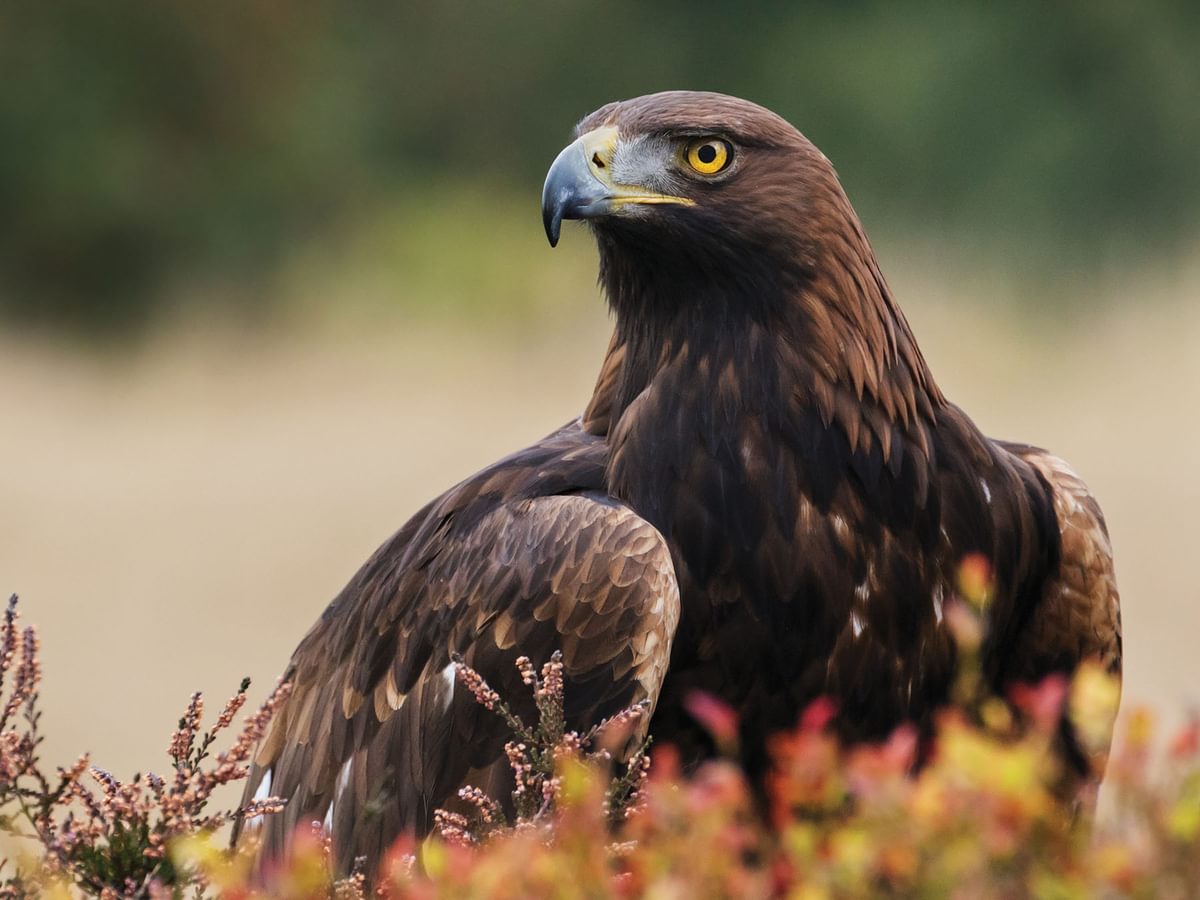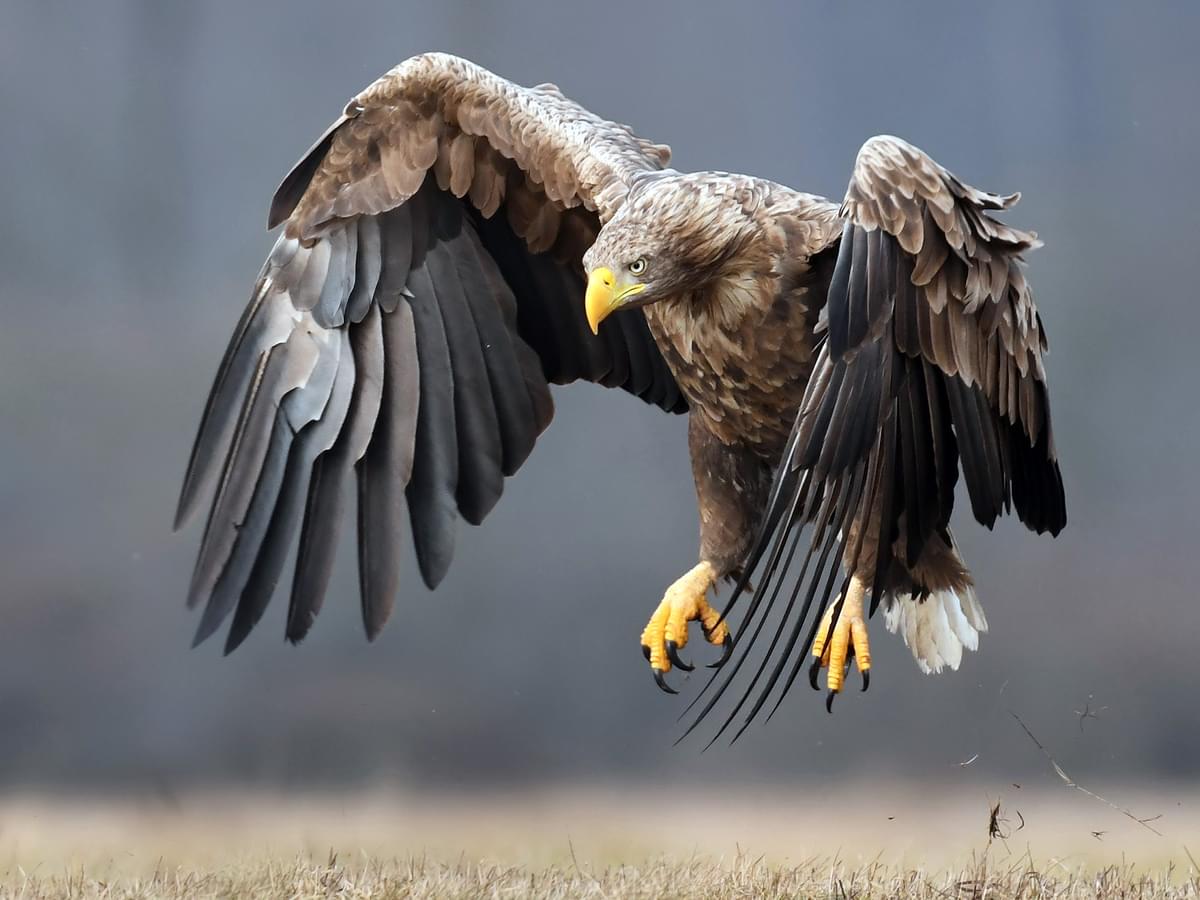Eagles, some of the largest and most formidable birds of prey, are amongst the most iconic birds on the planet. Eagles in the UK were once all-but-extinct in the 20th century, largely due to illegal killing but also habitat changes ushered in by widespread arable and livestock farming.
Today, eagle numbers are on the rise once more, but what types of eagles can you see in the UK, and where can you see them?
What eagles can be found in the UK?
There are two species of eagles residing in the UK today, the Golden eagle and the White-Tailed eagle. Both are exceptionally large and impressive birds with wingspans that typically exceed 2 metres. In terms of sheer size, the White-Tailed eagle just about prevails - it’s the fourth largest eagle in the world.
Eagles in the UK are still elusive creatures, but sightings are becoming increasingly common, not just in Scotland, north Wales, Northern Ireland and the north of England, but in the south of England too. This is partly thanks to conservation efforts such as the South Coast Eagle Project, which seeks to reintroduce eagles throughout the UK.
It’s perhaps strange to consider that these colossal birds were once a common sight throughout much of the country, but this may once again become the norm if numbers continue to rise at their current rates.
Read on to discover more intriguing facts about these wonderfully elusive, powerful and captivating birds of prey.
Golden Eagle
Aquila chrysaetos

Length
66-102cm
Wingspan
180-230cm
Weight
3-6.7kg
Golden eagles are one of the more widely distributed species of eagles. They maintain huge territories of some 50 to 60 square miles. These powerful birds are apex predators with large and sharp talons. Their vision is 4 to 5 times more powerful than the human eye, and they can swoop on their prey at speeds of some 120 to 150mph. Golden eagles are monogamous and often mate for many years, if not life.
White-tailed Sea-eagle
Haliaeetus albicilla

Length
66-94cm
Wingspan
180-240cm
Weight
3-6.9kg
The White-Tailed eagle is an exceptionally large bird with a wingspan of up to 2.4 metres. They have broader wings than Golden eagles and are identifiable by their striking white tail plumage. White-Tailed eagles are excellent hunters that prey on both mammals and fish; hence they’re sometimes known as sea eagles. Like Golden eagles, White-Tailed eagles maintain large, typically coastal territories, are monogamous and tend to mate for life.
Where can you find eagles in the UK?
Eagles in the UK are primarily distributed in the Scottish Highlands and across the Scottish islands, particularly the Inner and Outer Hebrides, but are also becoming increasingly common in Northern Ireland.
Where can you find Golden eagles in the UK?
The ancestral home of Golden eagles in the UK is the Scottish Highlands, and this is still where they commonly reside today. Golden eagles can be found all year round in the central and western Scottish Highlands. One pair of Golden eagles established a nest in the Lake District in the 1960s, but Golden eagles remain a rare sight in England.
Reintroduction programmes have been successful in Northern Ireland, and there are plans to reintroduce Golden eagles to Snowdonia in Wales.

Golden Eagle amongst the heather, in the moorlands, Scotland, UK
Where can you find White-Tailed eagles in the UK?
Despite there being fewer breeding pairs of White-Tailed eagles in the UK than Golden eagles, they are more widely distributed. White-tailed eagles have been successfully reintroduced in the Isle of Wight and are due to be reintroduced in Norfolk.
They are becoming a more frequent sight across much of England since they travel greater distances than Golden eagles, typically to roost. White-Tailed Eagles are most commonly distributed across the west coast of Scotland as well as across the Scottish islands. In Northern Ireland, White-Tailed Eagles have been sighted across the north coast and Country Antrim.

White-tailed Eagle flying over the Isle of Mull in Scotland
Eagles in England
The White-Tailed eagle is becoming an increasingly common sight across the Isle of Wight and the southern English coast. Golden eagles have been rarely spotted over the Lake District. Golden Eagle sightings are possible but rare in the north of England.
Eagles in Wales
Golden eagles have been sighted over north Wales, and there are plans to reintroduce them to Snowdonia. There are currently no White-Tailed eagles known to be breeding in Wales.
Eagles in Scotland
Scotland has the largest share of the UK’s White-Tailed and Golden eagles. Golden eagles are a regular sighting in the central and western Scottish Highlands, whereas White-Tailed eagles commonly dwell on the west coast of Scotland. Both Golden eagles and White-Tailed eagles inhabit the Scottish islands.
Eagles in Northern Ireland
There are some White-Tailed eagles on the north coast of Northern Ireland. Golden eagles are regular visits to Northern Ireland’s coastlines. There are plans to increase the number of both Golden and White-Tailed Eagles in Northern Ireland.
What eagles are native to the UK?
Both White-Tailed eagles and Golden eagles are UK native species, but both were persecuted throughout the 19th century leading to the extinction of White-Tailed eagles and the near-extinction of Golden eagles.
The last UK-bred White-Tailed eagle was shot in Shetland in 1918. Golden eagles survived in small numbers in Scotland and have been heavily protected ever since.

A Golden Eagle soaring through the sky
What do eagles eat in the UK?
Both Golden and White-Tailed eagles are carnivorous raptors (birds of prey). The Golden eagle’s main diet is birds and mammals, both alive and as carrion. White-tailed eagles are excellent sea hunters - hence why they’re also called sea eagles.
Due to their excellent vision and fast swooping speed, eagles are easily capable of catching fast-moving mammals such as rabbits and even small deer. White-Tailed Eagles have even been known to catch otters. Eagles very rarely attack livestock.
When were eagles reintroduced to the UK?
White-tailed eagles were first reintroduced on the Isle of Rum, Scotland, in 1975 and then again in Wester Ross in the Scottish Highlands between 1993 and 1998. In 2019, 6 juvenile breeding pairs were released on the Isle of Wight. There are plans to release White-Tailed eagles in Norfolk.
Are there bald eagles in the UK?
The bald eagle is sometimes confused with the White-Tailed eagle but does not currently reside in the UK, and there have been no known recorded sightings. Eagles very rarely stray too far from their territories.
